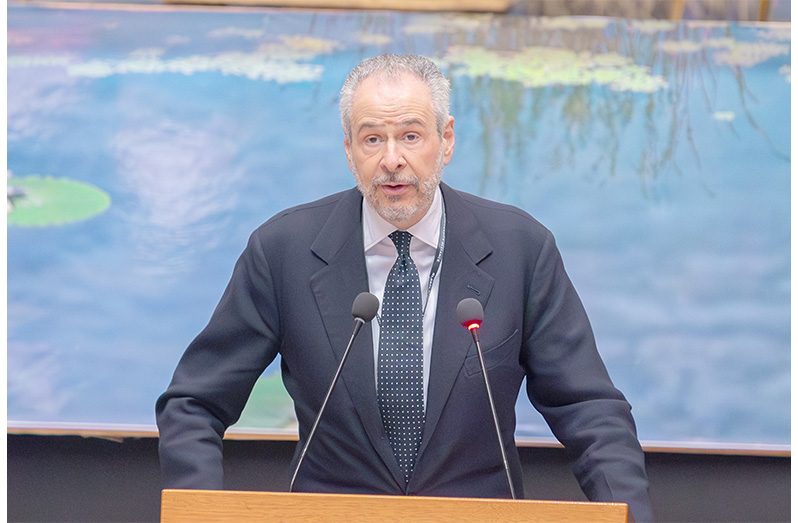–says int’l summit’s President, Ambassador André Corrêa do Lago
THE President of the 2025 United Nations Climate Change Conference (UNFCCC COP30), Ambassador André Corrêa do Lago, has declared that the upcoming COP30 in Belém, Brazil, will be “extremely dynamic” as he urged that biodiversity to be given equal weight alongside climate action.
Speaking on the second day of the Global Biodiversity Summit being held in Guyana, Ambassador do Lago described the forum as a crucial platform to ensure biodiversity ecosystems take their “rightful place” in the international climate conversation.
“The action agenda is going to be extremely dynamic and will be very much focused for the wider participation of this, local governments, of private sector, academia, etc.,” he stated, signalling a strong emphasis on inclusivity and multisectoral collaboration at this year’s COP30, slated to be held in Brazil.
Ambassador do Lago stressed that addressing the biodiversity crisis requires more than just the engagement of national governments.
“We know that we have little time and that we have to organise the information and the science, because we also have enough science and enough experience and enough good examples of things that are working,” he said.
In a call for collective and coordinated efforts, he highlighted the need to involve all segments of society including civil society, subnational governments, academic institutions and the private sector in what he described as a shared global fight for biodiversity and climate resilience.
On the topic of forest restoration, Ambassador do Lago made a passionate case for strengthening carbon markets.
“So, for restoration of forests, I completely agree that we need to have the most dynamic and efficient carbon market possible, because the credits from carbon rescue, from forest restoration are, by definition, much better credits than any other credits, because they are the only ones that captured CO2.”
He added that countries with significant forest resources have a responsibility to lead by example. “I think that it is our obligation as forest countries to prove that we can have extremely serious and verifiable credits from forest restoration. And so, I believe that there is a really impressive opportunity at COP30 for us to show how we can strengthen the idea of carbon market, of forest restoration, for avoiding deforestation.”
Ending his address with a call for unity and clear purpose, Ambassador do Lago said: “We have to work together to agree that there are solutions and we need to have a common way of seeing how to deal with the forest, or we’re going to be strongly manipulated, and we definitely know that we can avoid that.”
COP30 will be held in Belém, in Brazil’s Amazon region, a location symbolically chosen to underscore the global significance of forest preservation and biodiversity protection.
After nearly a decade, world leaders at last year’s climate conference agreed on the final building blocks to set out how carbon markets will operate.
Though a notable achievement, there were still concerns about how forested countries such as Guyana will navigate the market.
Global Ambassador for the United Nations Framework Convention on Climate Change (UNFCCC) and the Chief Executive Officer for the Caribbean Climate-Smart Accelerator (CCSA), Racquel Moses, had highlighted the inequity in the assessment of carbon credits, whereby most assessors are from the global north, which also produces much of the carbon.
She is advocating for a global south entity funded by the north to build capacity in assessing carbon credits fairly.
“We have to be vigilant; we have to be vigilant on the safeguards that are required to ensure that the carbon credits that are entering the market are quality credits,” Ms. Moses had told this publication.
BIODIVERSITY ALLIANCE
Guyana intends to make a case to generate credits for biodiversity.
Already, several leaders and experts have formally inked the biodiversity alliance which will serve as a collaborative space to complement and strengthen existing efforts under the UN’s Convention on Biological Diversity.
President Ali announced that a comprehensive paper capturing the summit’s key outcomes, findings, and international agreements will be formally presented at COP30 in Brazil later this year, advancing efforts to place biodiversity at the top of the global agenda.
The alliance is expected to enable new initiatives, and foster the development of innovative, inclusive and scalable solutions to address biodiversity loss.
It will be an active community of nations, businesses, corporations, organisations, communities, territories, academia and individuals committed to the shared vision working to securing biodiversity.



.jpg)








